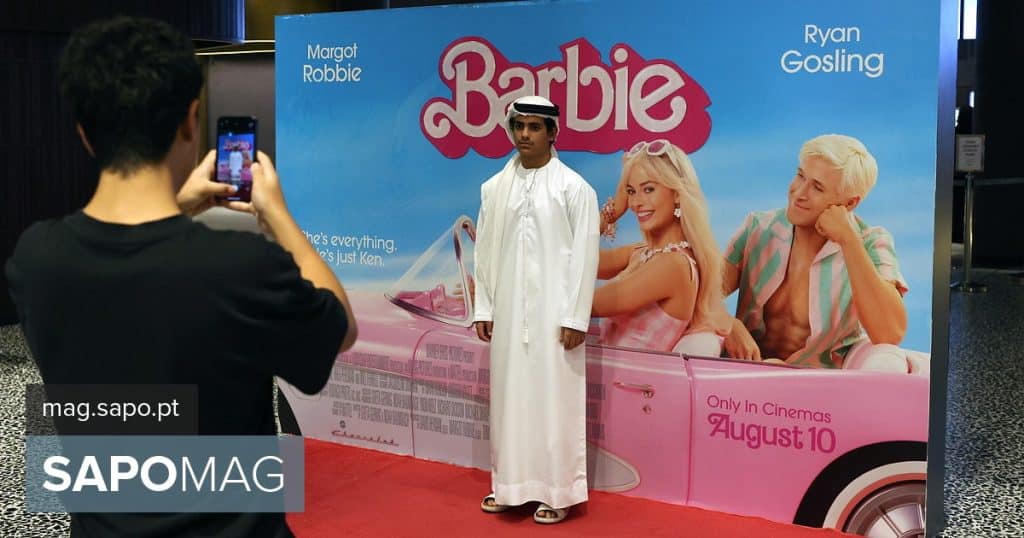Authorized in Saudi Arabia but banned in Kuwait, the world-famous film “Barbie” brings to light the divisions in Middle Eastern countries between opening speeches and still prevailing conservatism. Also shown in the United Arab Emirates and Bahrain, the film by Greta Gerwig is not yet available in Qatar and Oman, without any official announcement of the premiere. , spectators dressed in pink compete for ‘selfies’ inside an imposing frame with the image of the famous blonde doll.“We never imagined that such a film would be shown in Middle Eastern countries”, confides to France-Presse (AFP) Al-Amiri, an 18-year-old student who went to the cinema with friends to form her own opinion on the film which has been the subject of much criticism in the region. public”, many criticize him for presenting a vision considered extreme of the emancipation of women: the “barbies” occupy all the functions traditionally reserved for men, only one of them is pregnant, while the “Kens” are relegated to the background, being- denied them the highest responsibilities.
“Thinking” Feminism
Contrasts between “Barbie” viewers in Dubai” data-title=”Behind the pink glamour, “Barbie” disturbs Middle Eastern countries – SAPO Mag”> Contrasts between “Barbie” viewers in Dubai These criticisms did not stop Mounira to go to the cinema at the request of her “three Barbies”, her daughters also dressed in pink. “If the film includes values and principles contrary to ours, it should not be shown in Saudi Arabia and the Middle East”, said the Saudi to AFP, aged 30. But, she says, “we came to give the film a chance”. without male accompaniment or the sending of the first Saudi female astronaut into space. But these dramatic changes, carried out under the aegis of powerful Crown Prince Mohammed bin Salman, come with pressure on feminist activists, many of whom are still imprisoned. cinemas only reopened in 2017, after long years of prohibition, completely rosy events flourished on the occasion of the release of “Barbie”. However, behind the rosy glamor of the luxurious cinemas in Riyadh or Dubai, the malaise is palpable. “We want freedom and more openness, but when it comes to the ‘Barbie,’ I’ve heard that she disturbs masculinity,” Hanane Al-Amoudi, a Saudi tourist in Dubai, who refuses to see the film. For this housewife in full veil, who says she is in favor of “the emancipation of women”, the opening must be done in a “considered” way.
“White, colonial and superficial”
” data-title=”Behind the pink glamour, “Barbie” disturbs Middle Eastern countries – SAPO Mag”> If she opposes censorship in her country, Kuwaiti journalist Shaikha Al-Bahaweed regrets that “Barbie” gives “a one of the worst, if not the worst, vision of feminism”, particularly in countries that are already particularly resistant to it, dealing with “a white, colonial and superficial feminism”. “Feminism is not about replacing a patriarchal system with a matriarchal system, but for humanity to achieve a system based on justice and equal opportunities”, this journalist who is committed to women’s rights told AFP.According to her, the “Barbie” brand, criticized by many feminists for its physical standards unrealistic views it promotes, is contrary to “feminist thinking”, including the color “which symbolizes the division of social roles according to gender”. In Bahrain, Hassan Al-Husseini, a Muslim preacher with a million followers on Instagram, denounced a “revolution against marriage and motherhood”, as well as against men “without virility”. Also criticizing the participation of a transsexual actress, he urged the authorities to put an end to the screening of the film. discomfort in Middle East countries with regard to large American productions that seek to give greater visibility to minorities, particularly sexual minorities. ”, due to more or less explicit references to homosexuality or transsexuality.TRAILER “BARBIE”.
